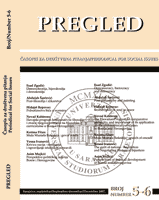O društveno-političkoj uvjetovanosti obrazovanja u Bosni i Hercegovini za vrijeme austrougarske uprave
About socio-political conditions made upon education in Bosnia and Herzegovina during Austro-Hungarian administration
Author(s): Elvira IslamovićSubject(s): Social Sciences
Published by: Univerzitet u Sarajevu
Keywords: Austro-Hungary; education; educational policy; breeding; school system; state; society
Summary/Abstract: Before the Austro-Hungary came into power, education in Bosnia and Herzegovina had religious characteristics, and was held within the religious institutions. Such a school system, due to religious orientation as well as its regulation, was not valued very much by the Austro-Hungarian administration. The introduction of capitalistic production relations, the development of industry, economy, and society in general, demanded educated labour, that could respond to new social needs. The unified school system named inter-denominational schools, that began in Bosnia and Herzegovina in 1879, had the aim to make as many children of all religions as possible attend these schools.The main aim of Austro-Hungarian politics in Bosnia and Herzegovina was to ensure the stability and durability of their power. That is why it was necessary to create the educational system which in its contents would suit the economic, military, and political objectives of the occupation. The state took more care about the funding and educational process. The educational system with its contents had to influence the creation of new social values, develop feeling of belonging to the new social community, and designate individuals for the system of power and make them loyal to it. Since the pedagogical aims depend on the social aims and social conditions, much attention in schools was paid to the creation of school books, curriculums, discipline of pupils, religious and moral breeding, as well as development of the idea of Austro-Hungarian state in schools. Considering that education has been the strongest process of socialization, i.e. norms and values of a society can be conveyed through the school system, the authorities had control over all educative and training institutions in the country.Undoubtly, there was always political motivation for construction of both primary and secondary schools. An important criterion while opening of a certain school institution was denominational structure of population in the area where they planned to open a certain school. Austro-Hungary realized that the stability of its administration in Bosnia and Herzegovina depended on keeping the proportional balance among the three different religious-ethnic communities. Having insight in the curriculums, school books and choice of teachers, one can clearly see the role of the school system in the recognition of overall politics of the Monarchy. Although the percentage of children attending the primary and secondary education in Bosnia and Herzegovina was law throughout Austro- Hungarian administration, the number of primary and secondary schools increased if compared to the period before, and these schools speaking in a pedagogical way made a certain progress. In the period of Austro-Hungarian administration in Bosnia and Herzegovina, dynamic changes happened in the field of education.
Journal: PREGLED - časopis za društvena pitanja
- Issue Year: XLVIII/2007
- Issue No: 5-6
- Page Range: 85-113
- Page Count: 29
- Language: Bosnian

